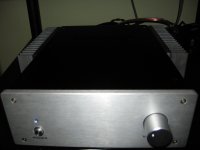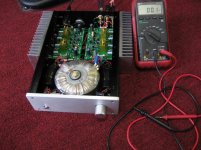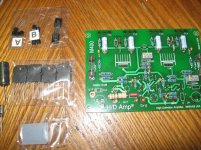do you mean more unreliable, dangerous to your speakers, possibly to your health and safety from skimping on electrical and fire safety measures?
at the "lower" end of the cost, perceived quality scale mass manufactured amps are cheaper than you can buy the raw parts for as an individual
good deals can be found on "intermediate" used amps from big consumer names - Earl Geddes has done research on amp distortion audibility, published in the JAES
he uses a Pioneer amp for demoing his custom waveguide speakers - clearly he believes the amp isn't compromising the sound
if you want a hobby and are willing to accept the higher costs for uncertain, possibly imaginary results then you can "play" with various audiophile fads, pretensions
at the "lower" end of the cost, perceived quality scale mass manufactured amps are cheaper than you can buy the raw parts for as an individual
good deals can be found on "intermediate" used amps from big consumer names - Earl Geddes has done research on amp distortion audibility, published in the JAES
he uses a Pioneer amp for demoing his custom waveguide speakers - clearly he believes the amp isn't compromising the sound
if you want a hobby and are willing to accept the higher costs for uncertain, possibly imaginary results then you can "play" with various audiophile fads, pretensions
I would like to see the advantages of building over buying.
From what I read, its basically a more direct/pure signal as there are not as many checks (thermal, short circuit protection, etc).
Why did you build your own over buying one already made?
Subject to the constructor's abilities, here are a few advantages:
Cost. Significant savings may be achieved in home-constructed equipment, especially when recycling old hardware. Disused or faulty amplifiers often have usable cases and working transformers, connectors and heatsinks (amongst other parts). These may be found online for next to nothing and can save the constructor from much of the mechanical work. The more skilled constructors may elect to build everything from scratch including the panels. One way or another, it shouldn't be too difficult to build fairly presentable-looking equipment for just a modest outlay.
Performance. Well-constructed equipment following a proven design (many of which are available on this forum) will often exceed the performance of commercial products costing many times more.
The experience. Building and commissioning your own equipment will teach you a considerable amount: Design, construction, fault-finding, etc.
Pleasure. The satisfaction of owning and using a home-made amplifier which performs well cannot be underestimated!
Experimentation. As for the signal purity, the constructor will be presented with many design options - some tried and tested, some cutting-edge and relatively unproven. Whether short-circuit or other protection is incorporated or not will depend on the risk the constructor is prepared to take versus their quest for the most direct signal path. It's all about choice.
Regards,
currentflow
Building an amp can get quite costly, especially when experimenting or when things don't go as planned. However, there aren't too many people who can say they built their own amps and you have a lot of control over the quality and construction to suit your needs..
Really the only way it can be cheaper is if you go with cheaper parts, which might be fine. Manufacturers buy in such bulk that they can get the expensive stuff we want at really low prices.
Really the only way it can be cheaper is if you go with cheaper parts, which might be fine. Manufacturers buy in such bulk that they can get the expensive stuff we want at really low prices.
The good feeling of building it!
Most of the diy amps made here are way better than many commercial ones. Most commercial ones are low in build quality and parts as well. and do not forget here at diyaudio.com there are some excellent and well known amp designers/builders that help you building very good amps. Building your own amp for sure is a wonderful feeling!
Most of the diy amps made here are way better than many commercial ones. Most commercial ones are low in build quality and parts as well. and do not forget here at diyaudio.com there are some excellent and well known amp designers/builders that help you building very good amps. Building your own amp for sure is a wonderful feeling!
Most of the diy amps made here are way better than many commercial ones. !
Measurably?

Measurably?
yes!, and also in quality of the parts that people use. in my case I use in my power supply Mundorf audio grade caps 125c. There are not many commercial amps that use Mundorf audio grade caps in their power supply. if you find one they are going to charge a lot!!!! just one cap is about $30 and some people use several or so. some people say all parts are the same...I do not think so!!!. But of course you will find some diy amps that sound like crab!.
This is from Mundorf site at partsconexion.
The Black (Titanium) Cathode coating is remarkably impressive at both measurements and music performance. The Titanium coating replaces the ordinary aluminum oxide coating (dielectric) in order to avoid the electrolyte being the cathode for the anode foil and, that the electrolyte operates as anode for the aluminum contact foil, simultaneously. Our Black Cathode electrolyte capacitor really does feature a separate cathode foil enabling super fast and almost loss free ion movement for reduced ESR, distortion and 'noise' to the utmost lowest level. These positive effects are similar to (but much stronger) graphite modified electrolytics (like Black-Gate).
With the MLytic® Audio Grade series we are extending our range of products to a series especially conceived for applications within pre-amplifiers or small power amplifiers.
The assemblage always refers to snap-in models for assembly boards.
Throughout its development, importance was placed upon attaining low ESR and ESL values, as well as, a low inner-sound development.
Specifications:
- Long lifespan
- All contacts welded
- Compact size
http://www.partsconnexion.com/prod_pdf/mund_ag.pdf
Last edited:
then where are the measurements?
I like to see comparative measures too - whats your "reference" amp?
You compare with some comercial amps now!!! I spent about $500 in my diy amp!
2sk1058 2sk2221 irfp9240 mosfet amplifier schematic
Attachments
then where are the measurements?
I like to see comparative measures too - whats your "reference" amp?
I could build it using dual power supply and use more capacitance (using two toroidal transformers and more caps) but my target was to build it as small as I could, but at the same time make it good. I had a Bryston B60R before this and the sound of this diy amp "believe or not" is better. The Bryston was a little noisy, and fatiguing at high volume and it got extremely hot. also it had back noise without input connected. my diy amp is as quiet as a mouse and it has more power and it does not get as hot as the Bryston. as long as I am happy with sound. all is good!
PS: to be a diy amp it is not so ugly (I think).
Last edited:
There aren't enough options in your poll.
I have amplifiers I have built, I have amplifiers I have bought. Instrument amps, hi-fi amps, kit amps, own design amps, datasheet recommended amps.
Going for the throat a bit here aren't you jcx? A sensibly built chip amp should come close to the performance quoted in the datasheet, which might easily exceed the paper performance of an off-the-shelf purchase.
I like measurements as much as the next man, but then I don't think the difference between 0.01% THD and 0.001% THD audibly significant. I know it's easy to get irritated by loose claims, but I don't think it's necessarily unreasonable for people to project performance figures from datasheet specifications or Spice simulations, particularly if it's a non-commercial application. I don't mean by this to encourage inflated hopes based on the purchase of boutique parts, I just don't see the necessity to rattle the cages of casual builders with such ferocity.
I have amplifiers I have built, I have amplifiers I have bought. Instrument amps, hi-fi amps, kit amps, own design amps, datasheet recommended amps.
then where are the measurements?
Going for the throat a bit here aren't you jcx? A sensibly built chip amp should come close to the performance quoted in the datasheet, which might easily exceed the paper performance of an off-the-shelf purchase.
I like measurements as much as the next man, but then I don't think the difference between 0.01% THD and 0.001% THD audibly significant. I know it's easy to get irritated by loose claims, but I don't think it's necessarily unreasonable for people to project performance figures from datasheet specifications or Spice simulations, particularly if it's a non-commercial application. I don't mean by this to encourage inflated hopes based on the purchase of boutique parts, I just don't see the necessity to rattle the cages of casual builders with such ferocity.
Member
Joined 2009
Paid Member
Like others, I build and I buy. I tend to prefer to build - it's DIY afterall. But I may in the future buy an amp because it offers a level of features and functionality I simply can't reproduce through DIY. DIY is mostly about simple power amplifiers. I leave remote controls, u-processors and other stuff to the commercial boyz - they get the parts so much cheaper than we do.
I also like the BS that floats around this hobby, it would be so boring if it was all down to engineering and also so useless without sound engineering.
I also like the BS that floats around this hobby, it would be so boring if it was all down to engineering and also so useless without sound engineering.
Why did you build your own over buying one already made?
I have both. PreMade is for critical listening (tubes) DIY just for a hobby.
You can make pretty decent sounding gainclone amp easily since it is proper powered hi quality IC basically.
do you mean more unreliable, dangerous to your speakers, possibly to your health and safety from skimping on electrical and fire safety measures?
at the "lower" end of the cost, perceived quality scale mass manufactured amps are cheaper than you can buy the raw parts for as an individual
good deals can be found on "intermediate" used amps from big consumer names - Earl Geddes has done research on amp distortion audibility, published in the JAES
he uses a Pioneer amp for demoing his custom waveguide speakers - clearly he believes the amp isn't compromising the sound
if you want a hobby and are willing to accept the higher costs for uncertain, possibly imaginary results then you can "play" with various audiophile fads, pretensions
I wouldn't buy his kit either, but I wasn't even aware of its existence until you provoked his third post.
Not everybody has your evident history with this poster, you would do us all a service if you simply called attention to his commercial interest rather than launching straight into legal-cross-examination mode or perhaps even waited for some indication that he was trying to leverage a sale as opposed to simply indulging an enthusiasm for DIY which you apparently don't share.
no connection there, my safety comments we inspired as the flip side of the OP's claimed "advantage" of simpler circuits
I also didn't immediately see the kit offering by lanchile, again I was reacting to the stereotypical audiophoolish ps quality commentary - the pics simply didn't show enough passives to really qualifiy as a superior supply - to claim that using a low esr, esl C was all that was needed is too simple
real amp, ps interactions exist, "simple" schematic amps often have insufficient loop gain and poor psrr, in those cases multisection ps filtering, even regulation can be required for decent performance
alternatively amps can be designed with adequate loop gain, proper compensation gnd reference to have superior psrr - as seen in Self, Cordell books
I figure there will be more than enough encouraging posts - someone should point out downsides, "inefficencies" in diy amp building
I would like to see the advantages of building over buying.
From what I read, its basically a more direct/pure signal as there are not as many checks (thermal, short circuit protection, etc)...
I also didn't immediately see the kit offering by lanchile, again I was reacting to the stereotypical audiophoolish ps quality commentary - the pics simply didn't show enough passives to really qualifiy as a superior supply - to claim that using a low esr, esl C was all that was needed is too simple
real amp, ps interactions exist, "simple" schematic amps often have insufficient loop gain and poor psrr, in those cases multisection ps filtering, even regulation can be required for decent performance
alternatively amps can be designed with adequate loop gain, proper compensation gnd reference to have superior psrr - as seen in Self, Cordell books
I figure there will be more than enough encouraging posts - someone should point out downsides, "inefficencies" in diy amp building
- Status
- This old topic is closed. If you want to reopen this topic, contact a moderator using the "Report Post" button.
- Home
- Amplifiers
- Solid State
- Amplifiers: Building Vs Buying


